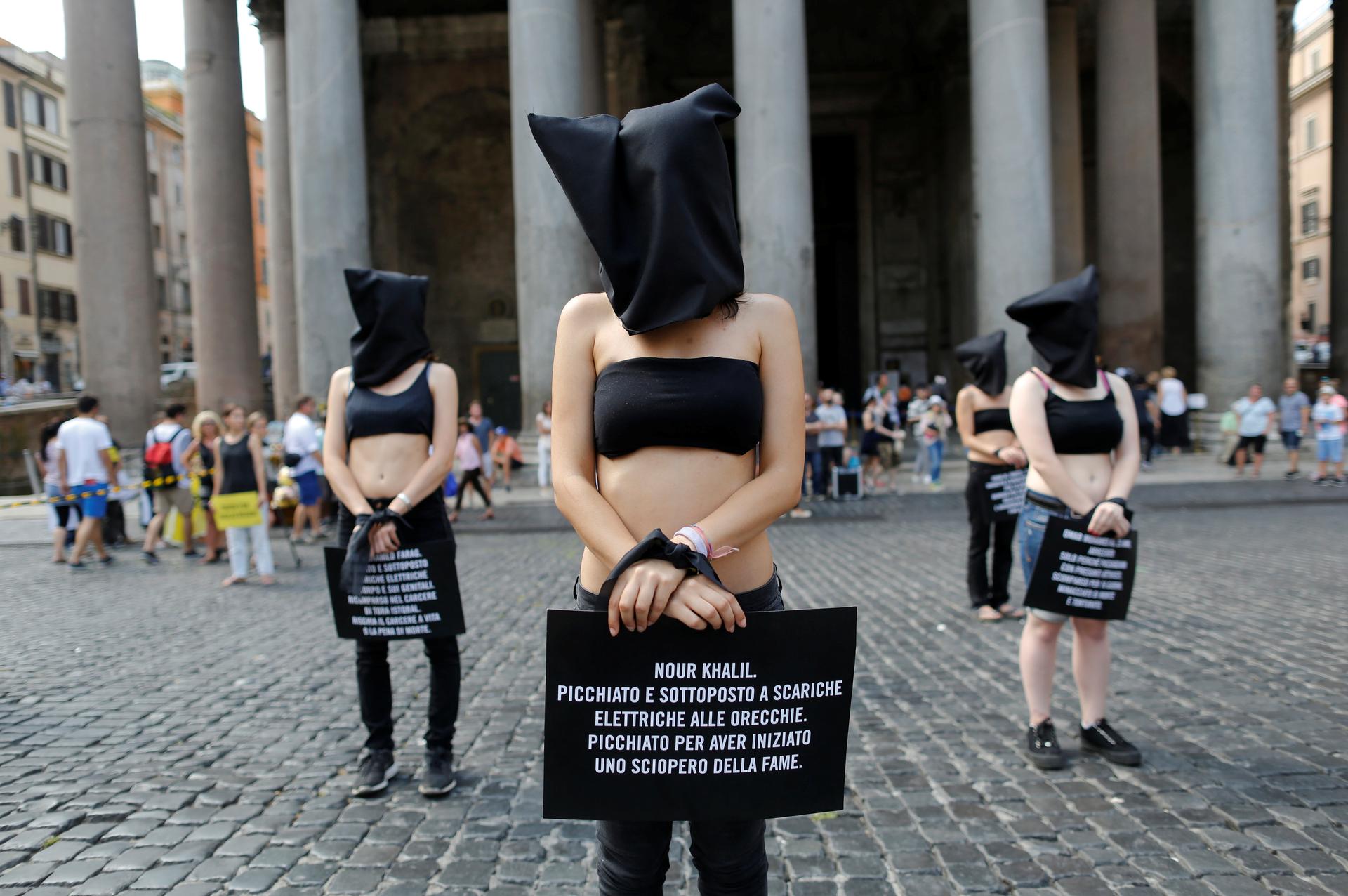Just as Egyptians point at US police brutality, a new report slams Egypt’s horrifying record
Amnesty International activists take part in a protest in Rome against Egypt's forced disappearances on Wednesday.
Like many people around the world, lawmakers in Egypt expressed serious outrage at the recent US shootings by the police.
Washington has no credibility on human rights, they said. "Don't tell us not to kill civilians if you're going to."
Nour Youssef, a reporter for The New York Times in Cairo, says that Egyptian media coverage of the two black men killed in Minneapolis and Louisiana by police officers "verged on gloating."
"There was a very condescending and even celebratory tone," she says. "The coverage blamed officials and drew contrasts between how the international media covers stories of police brutality in the US and in Egypt, and said [the West] have been unfair to the Egyptian government, they have been overly critical, and have no legs to stand on."
But a closer look shows police in Egypt take brutality a lot further than what's happening in the US.
After President Abdul Fattah al-Sisi overthrew his predecessor Mohammed Morsi in 2013, Egyptian security forces killed 900 civilians, who were protesting the takeover, in a single day. About 40,000 others are believed to have been jailed for opposing the regime.
Following the Egyptian lawmakers' remarks, Amnesty International published a scathing report on the brutal repression, disappearing and torture of civilians by Egypt's national security agents.
“The latest popular method deployed by the national security agency in Egypt to silence critics of the government is forcibly disappearing people, sometimes in broad daylight,” Youssef says.
“State agents detain a person in an undisclosed location, denying them access to their lawyers, to their families, and usually even publicly deny that they have arrested the person.”
“Usually what happens to disappeared people is they show up in a morgue, or show up later in an official detention center with charges, and that can take months or weeks or a few days. There has also been an uptick in the deportation of journalists and human rights activists,” says Youssef.
Egypt's Foreign Ministry accused Amnesty International and other advocacy groups of biased attempts to tarnish the country's image.
“There is very little opposition to the Egyptian government in the parliament so lawmakers in Egypt tend to support that line as well,” Youssef adds.
But there have been highly publicized examples of oppression in Egypt. Take the 14-year-old boy, a suspected member of the outlawed Muslim Brotherhood, who the Amnesty report alleges was disappeared, then raped and tortured by officials for his confession, and is now awaiting trial. There's also the case of an Italian PhD student at Cambridge, whose body was found by a roadside.
“Essentially every individual who enters the political sphere in Egypt, and is not within the government camps is exposed to this risk and many of them have suffered as a result,” Youssef says, adding that she knows at least four people who have been forcibly disappeared.
“Families and friends go to government departments and they are given no answers constantly by security officers, they are given the run around, and officers show no interest in actually investigating reports of disappearances,” she says.
Families who ask around and journalists who try to investigate are also at risk.
“The risks are becoming increasingly higher. There are instances where lawyers who made official inquiries about those who were forcibly disappeared, were forcibly disappeared themselves or deported or banned from travel.”
But the Egyptian public remain split in their opinions of the government’s abuse of civilians.
“Some would agree [with the Amnesty report] in private, but not in public, because naturally they fear for their lives,” Youssef says. But “a large portion of the population supports the government right now.”
“Some people in Egypt look at all of this as the price for the pursuit of stability,” she says, “and they say that this is better than becoming Syria or Libya or seeing armed conflict on the streets, because that is the alternative that the government says they have.”
Our coverage reaches millions each week, but only a small fraction of listeners contribute to sustain our program. We still need 224 more people to donate $100 or $10/monthly to unlock our $67,000 match. Will you help us get there today?
